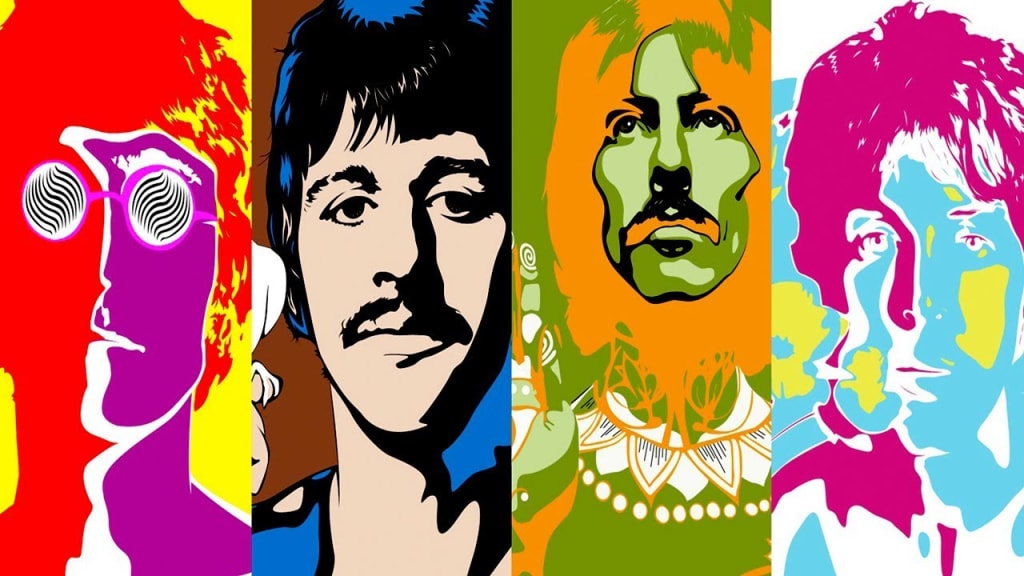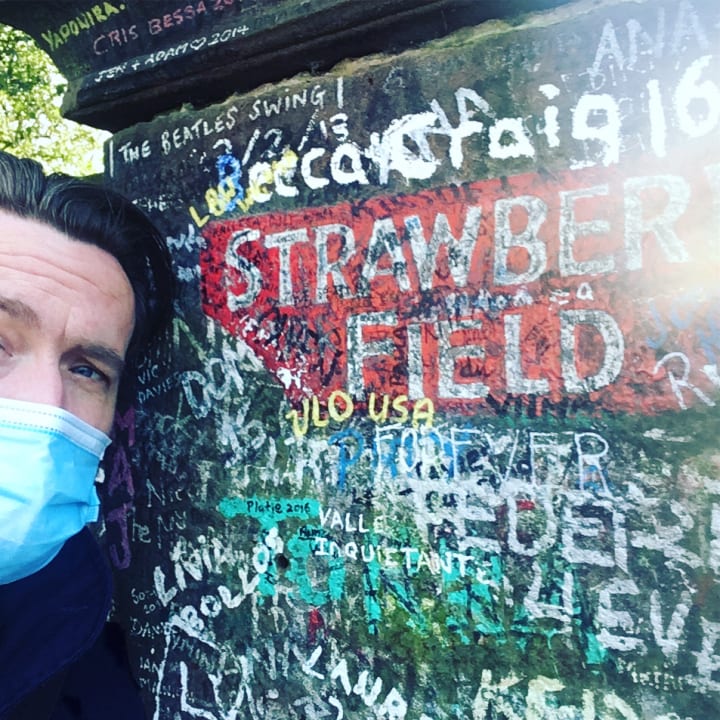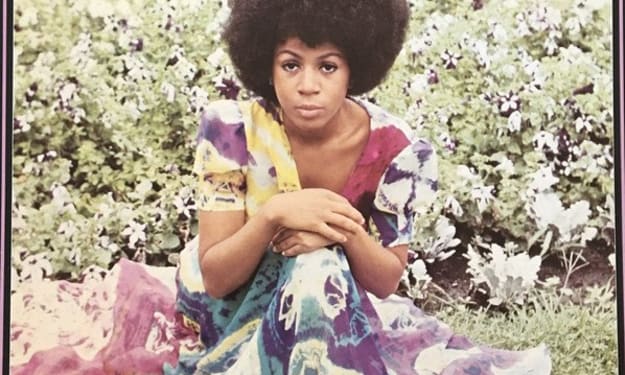Moments Of Calm With The Fab Four
Ease into those Golden Slumbers

“Turn off your mind, relax and float downstream” The Beatles, ‘Tomorrow Never Knows’
I really don't need an excuse to revisit the back catalogue of The Beatles.
In fact, if you've read anything I've ever written, you know full well that immersing myself in the music of the Fab Four is my favorite past-time. If I need a musical hit, John, Paul, George, and Ringo are always my first port of call.
But, relaxing Beatles' music? At first glance, that was a tricky proposition.
In my eyes, The Beatles were many things - meditative was not one of them. However, was my assessment fair? Was my opinion of them based - primarily - on the fact I've always enjoyed their faster, rockier tracks, meaning I'd overlooked the 'quieter' parts of their canon?
Turns out that I was being unfair. Because The Beatles were just as adept as writing music that can calm our racing, monkey-minds, as they could churn out tracks that get our blood pumping.
In fact, the more I explored, the more songs I discovered, so much so that I've not only begun to appreciate this side of them more, but - if anything - it's actually now become the part I enjoy most. The Beatles may have been the most famous rock band that ever was, but they're also the ones with the best chill out tracks.
Why? Well, it turns out that I'd also ignored a pretty obvious fact: During the late 1960's The Beatles became obsessed with Eastern culture, in particular with the concept of transcendental meditation. Like many, I was always a bit skeptical of this - it was a key part of the decade's anti-establishment (i.e. anti-Western) counterculture; everyone became a hippy, and claimed to be looking to the East. Often unconvincingly so.
And The Beatles' embracing of all this didn't always ring true. Apart from George's newfound fascination with the sitar, the Fab Four's visits to the Maharishi Mahesh Yogi always struck me as opportunistic, not least as - on a personal level - they weren't exactly living lives that aligned with the doctrine of peace, and love that their guru espoused.
However, once more, I was being unfair.
On one level, it may have been just what everyone else was also doing, but - in The Beatles' case - it also heavily influenced their work in the second half of their career when they eschewed touring in favor of cocooning themselves in the studio. Many of their songs didn't just borrow the trapping of Eastern culture, they actively employed them. Lyrics that explore the sense of 'self', and the divine beauty of the natural world; music that uses repetition, and cadences that build but are never resolved... These aren't just evocative of meditation - they are perfect to actually meditate to.
They're ideal accompaniments to help you attain a state of Zen.
If you need a hand in reaching inner peace, here's five tracks you might want to listen to as you journey inwards:
5. 'Flying' (1967)
Trivia Alert! This was the first Beatles' song to be credited to all four members, 'Harrison/ Lennon - McCartney / Starkey.' Which, on the surface of it, is a bit strange, because it's not exactly a barnstormer. It's a weird, low-key track that runs just over two minutes, and was recorded in a single day.
Given that it was produced when they were at the height of their experimental phase, and when they often spent weeks on refining just one track, 'Flying' is an anomalously straightforward affair. All four may have been credited with writing the piece, but it's hard to argue that it pushed any of them to their songwriting limits, and, given the speed with which it was recorded, it's unlikely to have tested the group's considerable musicianship.
Yet, I still love it.
Not only is it a brief respite from the rest of the chaotic, slightly ramshackle madness on the rest of 'Magical Mystery Tour', it's a wonderfully soothing track in it's own right. The song doesn't really go anywhere, and has no discernible chorus - it just gently meanders around for two minutes. It's not so much a song as a fragment of an aural landscape.
When I listen to it, I can easily imagine myself floating in the clouds; it isn't just the title that evokes a sense of flight - the wordless melody, and Lennon's ethereal mellotron makes me feel as if I am high in the sky, peacefully surfing the air currents. It lowers my blood pressure instantly.
The only negative is that it doesn't last long enough - I'd happily spend a few hours on my metaphorical flight.
Many see this track as The Beatles at their most self-indulgent. I couldn't disagree more. Not only is it two minutes of Zen, it's also a window into a world where The Beatles didn't just write perfect pop songs; what if they'd explored this area more, what if they had done more purely instrumental tracks? Given that they were happy to go gloriously off-piste, a whole album of lyric-less songs might have been hard-going at times, but if it had given us more songs like 'Flying' it would have been worth it.
4. 'Golden Slumbers' (1969)
This elegiac song is perhaps best known for being part of the climactic, wonderfully messy, opus that is 'The Medley' at the end of Abbey Road. However, like the other songs in that strange climax, it can also stand on its own, and is just as good when separated from that concoction as when it is when woven into that chaotic musical tapestry.
For such a memorable track, it's not wholly original. McCartney based it on the lullaby 'Cradle Song' from Thomas Dekker's 1603 play 'Patient Grissel.' However, Dekker himself 'borrowed' the idea of his play from both Chaucer's 'Canterbury Tales' and Boccaccio's 'Decameron', proving there's mileage in the adage, 'good artists copy; great artists steal.' (I've also given myself a bonus point there for getting Boccaccio and The Beatles into the same article.)
According to legend, McCartney saw the sheet music for 'Cradle Song' on the piano at his father's Liverpool home. It had been left there by his step-sister, Ruth. Liking the poem, but unable to read the music, Paul wrote his own. Whereas the lush, orchestral melody is pure Paul, the actual words remained (largely) Dekker's. A few subtle adjustments had been made, but - really - in an ideal world, the credits for the song should read, 'Lennon / McCartney / Dekker.'
In many ways, 'Golden Slumbers' is typical of McCartney during the late 1960's. On the one had, there is a melodic (and lyrical) simplicity - on the other, a rigorous, technical perfectionism: The orchestral overdubs, that required the work of thirty separate musicians, took an entire day to complete on their own.
It was worth the effort.
There is an underlying sadness to the song; like much on 'Abbey Road', it hints that the Fab Four are reaching the end. But, 'Golden Slumbers' is also a beatific, lush piece. It might be short, but it's an instant dose of calm. It's the musical equivalent of a very comfy pillow. Put it on repeat, and let yourself sink into its sublime blissfulness.
(On an unrelated trivia note, John Lennon missed the majority of the sessions when the group recorded the track having been hospitalized in Scotland following a car crash.)
3. 'Strawberry Fields Forever' (1967)
Such is the fame of this song, I could easily write an entire article about it.
However, for now, I'll stick to the bits that are relevant to Zen.
Lennon began writing 'Strawberry Fields Forever' during the filming of 'How I Won the War' in which he had managed to nab himself a small role (for the record, he's one of the best things in the movie). However, overall, this wasn't a happy period for John.
The Beatles had just retired from touring following one of the most difficult periods of their career. For a band who had got everything right up to this point, they'd suddenly got a fair bit, catastrophically, wrong.
First, there was the fallout from the Philippines fiasco. When they failed to attend a reception in the honor of the country's First Lady, Imelda Marcos, the local Manila media whipped up a frenzy, and The Beatles found themselves the target of mob violence.
Then there was John's 'more popular than Jesus' remark, which resulted in many US states banning the group, and previously devoted fans burning their records.
Retreating to Spain, to film Richard Lester's anti-war movie, may have given Lennon some respite, but even that was double-edged. Although more than proficient in front of the camera, filming without his band-mates left him feeling vulnerable, and inspired a brief period of deep introspection, and with him searching for spiritual meaning.
One of the results of which was 'Strawberry Fields Forever.'
The song seems to convey a nostalgia for The Beatles' early lives in Liverpool, in particular the former Salvation Army children's home in Woolton near to where John grew up.

But, it was the group's producer, George Martin, who noticed that, despite the title referring to a real-life location, John's song was more of a "hazy, impressionistic dreamworld", and owed more to Lennon's experiences with LSD, which caused him to question his identity, his long-held obsession with Lewis Carrol's surreal masterpiece, 'The Jaberwocky', and the Hindu teachings he was gorging himself on at this time, than it did to any place in literal existence. When you also factor John's profound introspection during this time, you get 'Strawberry Fields Forever.'
He wasn't exaggerating when he described the song as "psychoanalysis set to music."
But if it worked for him, it can for you too.
When Lennon sings, "Nothing is real", he's not just evoking the Hindu concept of 'maya' (or 'the illusion of reality'), he's also echoing one of the central tenets of mindfulness; our thoughts aren't 'real', and we need to be weary of accepting them as such. The idea is repeated over and over again, and is the ideal reminder to unfix yourself from the physical world, and our reactions to it, and journey within. To find what is 'real' within ourselves.
The music supports this; with it's hypnotic, almost-Morse Code melody, it invites a meditative state.
Put it on, and lose yourself in Lennon's otherworldly exploration of the ego.
(On yet another unrelated trivia note: McCartney wrote 'Penny Lane' in direct response to Lennon's song; if John could write a masterpiece about their Liverpool childhoods, then he would as well. The sheer absurdity of that astounds me: Two classics, one of which was pure upmanship, and the result of one of them simply trying to outdo the other. Even when they were being petty, they were still capable of genius.)
2. 'Here Comes the Sun' (1969)
The song that proved that George Harrison could match Lennon and McCartney, was actually written during an act of truancy.
Let me explain.
The late 1960's were an unhappy time for George. In addition to being so disillusioned with the band he temporarily left The Beatles, he was also arrested for marijuana possession, and had his tonsils removed. He soon rejoined the group, but things didn't improve on that front.
Apple Corps, the company they'd formed to manage all of their business affairs, was a gigantic mess, and John, Paul, George, and Ringo were spending as much time sorting that out as recording music. Days could be wasted in business meetings, something Paul might have enjoyed but that were anathema to Harrison. So, playing truant, he skipped them.
Instead of sitting in a poky office in London surrounded by accountants, George hid out at the Surrey home of his friend, Eric Clapton. And it was there that he wrote 'Here Comes the Sun.'
"It was written at the time when Apple was getting like school, where we had to go and be businessmen: 'Sign this' and 'sign that.' Anyway, it seems as if winter in England goes on forever, by the time spring comes you really deserve it. So one day I decided I was going to sag off Apple and I went over to Eric Clapton's house. The relief of not having to go see all those dopey accountants was wonderful, and I walked around the garden with one of Eric's acoustic guitars and wrote 'Here Comes the Sun.'"
Thus, in reality, the lyrics aren't just about the arrival of Spring, and the blossoming of new life after the ardors of Winter, it's also about the joys of not having to do paperwork. It's the most streamed of all The Beatles songs, with 360 million hits and counting; who know a track about the horrors of admin had such appeal?
Yet, it's also a beautiful song. It's an ode to rebirth, to the good times that lie ahead. It does not, on the surface, owe as much to Eastern music as George's earlier 'Within You, Without You' or 'Love You To' which are very heavy on the sitar, but with its emphasis on resurrection, and the power of nature, it also shows that George hadn't just acquired musical expertise from his time in India; his lyrics showed he'd taken away something much more profound.
It's the ideal song to listen to if you've had a bad day, or your monkey mind is chattering away relentlessly. Turn it up, and let George's life-affirming hymn to the natural world, backed up by his exquisite guitar playing, wash over you.
(More trivia: George's belief that the tail-end of 1969's Winter was particularly grim, and that Spring rocks, is backed up by actual meteorological data. Records show that February and March were the coldest of the decade (it had really been a 'long, cold, lonely Winter'), while the Spring that followed set a record for sunlight hours that wasn't beaten until 1989. 'Here Comes the Sun' - a song about the perils of accountancy, that also boasts meteorological accuracy. How many other tracks can instill a sense of calm, and claim those things as well?)
1. 'Across the Universe' (1969)
This 'cosmic ballad' not only contains the words Lennon was most proud of ("It's one of the best lyrics I've written. In fact, it could be the best. It's good poetry, or whatever you call it, without chewin' it"), it's also a song with very direct links to meditation.
In fact, it's The Beatles' most overt nod to transcendental meditation. Albeit one that is filtered through John's specific understanding of it.
Superficially, the song is pretty straightforward - verse; chorus; verse; chorus; etc. But, unlike many Beatles' songs, it doesn't really build; there is no 'Hey Jude' or 'All You Need Is Love' - like cacophonous climax; it just gently fades out with the same lack of fanfare in which it began.
However, that same lack of development in also present within the song; the orchestral dubs in the background may get slightly fuller when Lennon moves into the chorus, but it's a very subtle gear change. To all intents and purposes, the verse simply segues into the chorus.
There's a deliberate 'samey', almost hypnotic, feel to the whole piece. The rich lyrics, and the lush - if subtle - accompaniment do just enough to stop the song from becoming monotonous. But, it's more chant than pop song; it's not hiding it's repetitive nature, but reveling in it. And that's where transcendental meditation comes in.
The meditation practice requires the participant to sit with their eyes closed twice a day for fifteen minutes at a time. Whilst in this physical state, they recite - silently - a mantra (or sacred utterance). Everyone has a different mantra, one that is personal to them, and which has been given to them only after they have been instructed by a trained teacher, who themselves have followed the guidelines created by Maharishi Mahesh Yogi.
The mantra employs Sanskrit sounds, the language which is argued to be the closest possible human imitation of the natural vibrations produced by the dynamism of the unified field. That is, the field identified by objective modern science as the silent source of all creation, and by yogis as being the field of 'Pure Consciousness', i.e. that of the self.
In addition to being personal, the mantra is also - ultimately - a meaningless sound. If you used a word with any literal meaning, your mind would think about it, and not allow itself to go beyond, or transcend, that level of linguistic literalness.
The mantra also has to have the correct vibration, ideally one that is as close to the primordial hum ('Om') as possible. This settles the mind, calming it.
After a short time, repeating this mantra has silenced the mind utterly, and you've began the process of transcending your physical constraints; healing or enlightenment can finally begin.
Although it might contain his best lyrics, with its emphasis on repetition, 'Across the Universe' is Lennon's musical version of a mantra. Despite the rich poetry, it relentless uniformity pulls you in. There's too much lyrical beauty to ever be fully absorbed, but that's what it's trying to do.
Then there's the bridge (that part linking the verse and chorus): "Jai guru deva om." It's a Sanskrit phrase that, translated literally, means "Glory to the shining remover of darkness." However, it can also be written, "Victory to God divine", or "All glory to Guru Dev" - the latter being a phrase commonly used by the Maharishi himself when he talked of his own spiritual teacher.
In all likelihood, "Jai guru deva om" is the mantra Lennon personally used when meditating. It's no surprise that, in a song that reflects the mechanics of meditation, he inserts the very words he employed when doing so. It's another soupçon of spirituality in a track that already oozes it.
As I said before, the song is simply too rich to be truly meditative. But, for a track that directly reflects what Lennon had learned about the practice of meditation, it is - unsurprisingly - remarkably calming. You might not find a true sense of your 'self' while listening, but you will find calm. An ocean of it.
This was one of the most fascinating journeys I've taken in my search for greater appreciation of the Fab Four.
I've discovered what the mellotron is, that John Lennon was really (really) unhappy during the mid-1960's, that George Harrison hates paperwork, and that McCartney was once influenced by a Jacobean playwright most people have never heard of. I've also realized that their obsession with all things Eastern wasn't superficial, and that it directly influenced, and was arguably the driving force behind, some of their most interesting songs.
It's also given me my Zen Playlist.
Not for the first time, I'm grateful for The Beatles. The next time I meditate, I'll focus on that gratitude. And I'll use the tracks listed here to guide me to that place of calm... Wait: using the music I'm grateful for, to help me actually be grateful for that very same music? Whoa - we're going down a rabbit-hole there. Lennon would probably write a masterpiece about that... and then Paul would probably try to outdo him.
----------------------------------------------------------------------------------------
If you've liked what you've read, please check out the rest of my work on Vocal, including my piece exploring some of the more arcane, less well-known facts about the Fab Four:
You can also find me on Elephant Journal and The Mighty.
If you've really liked what you've read, please share with your friends on social media.
If you've really, really liked what you've read, a small tip would be greatly appreciated.
Thank you!
About the Creator
Christopher Donovan
Hi!
Film, theatre, mental health, sport, politics, music, travel, and the occasional short story... it's a varied mix!
Tips greatly appreciated!!
Thank you!!






Comments
There are no comments for this story
Be the first to respond and start the conversation.